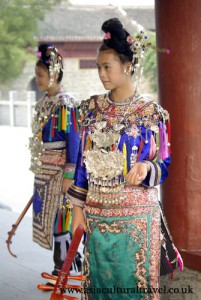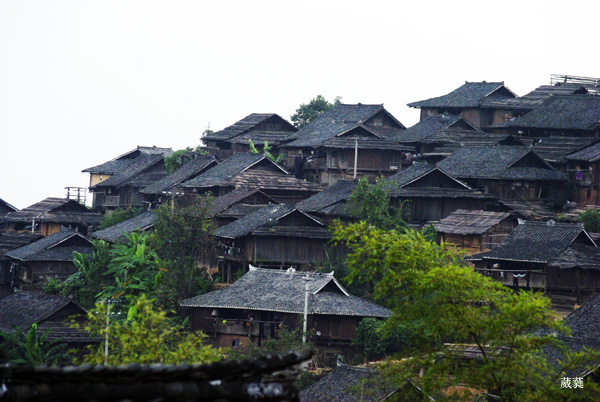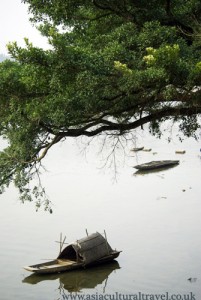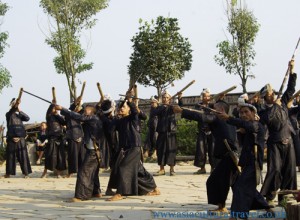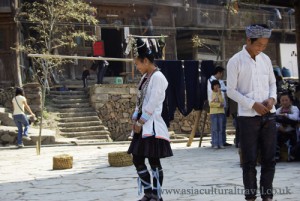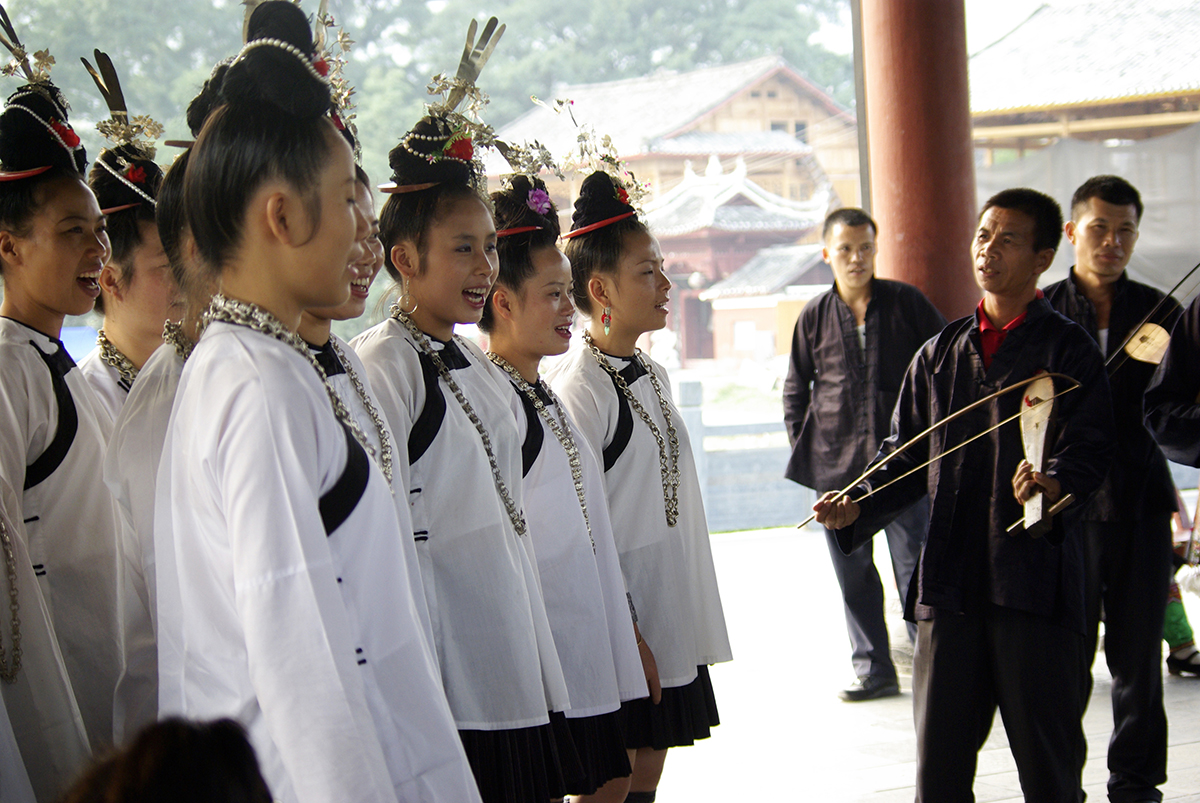
This is not just your average tour. This is an adventure. The transportation and the accommodation available to you in this region may be basic but the distinctive culture, special architecture and stunning scenery is so awe-inspiring, so unforgettably beautiful, that it will more than make up for any inconvenience you face there.
Simple introduction to the Dong ethnic group:
As one of the minority groups in China, the Dong People have their own language, but no word. There are more than 3 million Dong people living throughout Guizhou, Hunan and Guangxi province. Dong people have a particular talent for music. They are famous throughout China for their singing. Culturally they have developed the habit of singing songs while they are working and farming. They also have many interesting traditional folk tales and dramas that were originally based on their daily life, mostly about how to find love.
The Dong people have their own style of architecture. The central symbol of any Dong village is its Drum Tower. Normally each Dong village has one to three big-name families living in it and each of these big families will have their own Drum Tower. The Wind-Rain Bridge is another common construction attributed to the Dong ethnic minority. A large Wind-Rain Bridge can look like a palace that has been built on a bridge.
Nowadays most Dong people still follow a traditional way of life in their hometowns. To this day you can still see their special houses, their traditional dress and their unique way of celebrating festivals. But unfortunately no one knows how long this exceptional culture will survive. More and more young people from the Dong community want to live like people from the “outside world” as they see it. The art of batik, embroidery, silverwork, and even singing is gradually being lost. Nowadays, in some Dong villages, you can still enjoy some authentic “performances” that are not staged for tourists. But who knows how long this opportunity will last?
About this trip:
It’s time to explore a culture that is indescribably different from your own.
Highlights of the trip:
- Studying the architecture of a traditional Dong village;
- Witnessing first-hand the delicate traditional dress and adornments of the Dong people;
- Listening to the beautiful songs and watching the graceful performances that are associated with traditional Dong culture and customs;
- Sampling the delicious local Dong cuisine.
Summary of the travel plan:
By now, if you’ve read this article carefully, you will already have some general knowledge about this ethnic group. Throughout this tour, you will delve into the daily life of the Dong people, witness first-hand how they live, and develop an in-depth knowledge of their culture. You will get a rare glimpse of their daily life. You will be given the opportunity to do some light research into their architecture. You will be privy to demonstrations of their songs and folk performances, which is why we have chosen the middle of August (according to the Chinese lunar calendar) to hold our tour as this is when their biggest festival takes place. And, finally, you will get to sample their local food. We are sure you will love their rice wine!
On the tour you will be staying in the traditional wooden houses found in all Dong villages. You must be very curious about how modern their houses are. There’s no need to worry! We will set you up in a local hotel that has some basic, modern facilities. However, we recommend that you bring your own sleeping bag with you, as the beds in the hotels will also be quite basic.
We are certain that you will be deeply impressed and moved by their beautiful songs even though you won’t be able understand their language or their meaning. By listening to their music, you may feel that, in some incommunicable way, you have entered their world. After that, you may even want to plan your next journey there and try to live like a true Dong local.
What information will we provide you with in advance?
- Useful information about the Dong ethnic group, including their history, their way of life, their festivals and customs, their architecture, their traditional dress and adornments, the geography of their hometowns and their current situation;
- Specific information about each village on your trip;
- Information about the transportation and accommodation you will use;
- Some useful Chinese phrases that you can use to communicate with locals on a very basic level while you are there, such as how to ask locals for directions, how to purchase the tickets you will need and so on. We will also provide you with the names (in Chinese) of the local dishes and the souvenirs you may be interested in purchasing.
Travel itinerary
Day 1: Arrive at Guiyang, the capital city of Guizhou province.
Activities:
- Go to the supermarket and buy all necessary items for daily use, e.g. tissues, shampoo etc.;
- Have a good rest after your international flight. Don’t get restless; you will start your adventure soon!
- Enjoy a leisurely tour of Guiyang.
Tourists Attractions in Guiyang: Jiaxiu Tower.
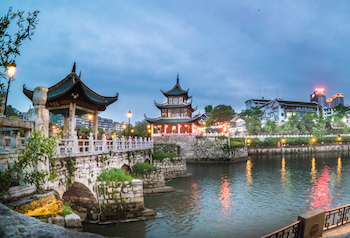 We recommend you visit Jiaxiu Tower in the late afternoon, around about 3pm. You can have dinner nearby and after dinner you can enjoy the view of the Tower at night. You may get to see some local people setting off Sky Lanterns in the square. There’s also the opportunity to walk around and get a feel for the local life in a Chinese city. There is a night market nearby where you may find some interesting things to buy.
We recommend you visit Jiaxiu Tower in the late afternoon, around about 3pm. You can have dinner nearby and after dinner you can enjoy the view of the Tower at night. You may get to see some local people setting off Sky Lanterns in the square. There’s also the opportunity to walk around and get a feel for the local life in a Chinese city. There is a night market nearby where you may find some interesting things to buy.
Accommodation: Four-star hotel near the city centre and Jiaxiu Tower (about £40 per night)
Transportation: We recommend that you take a taxi from the airport to the hotel, which should cost no more than £20. We also recommend that you take a taxi to the coach station the next day, which should cost no more than £5.
Note: We recommend that you go to sleep early and try to enjoy the luxurious hotel bed while you can. This is the most comfortable hotel you will stay in on your trip. You should also try to conserve your energy so you can start your adventure the next day.
Day 2: Go to Rongjiang from Guiyang; visit Sanbao village
- Leave for Rongjiang by coach at 9:40 am from the stadium coach station in Guiyang. It will take you roughly 3 hours to get to Rongjiang.
- Arrive at Rongjiang just after midday. From here you have two choices: you can find a small restaurant and have a simple lunch near the coach station, or you can go straight to Sanbao village and find a special, local restaurant there. If you are really starving after the long coach journey, we suggest that you eat something near the station.
- Visit Sanbao Village. Take a taxi from the coach station to the village, which should hopefully only cost about £1. When you arrive, there will be some performances taking place inside the village. Normally if a big group of people arrive together, then a performance will start immediately. If all else fails, you can just walk around and explore the village until you hear the music or the songs, and then you can head back for the performance. Sanbao sits on the banks of the Duliujiang River. The beautiful view there of the moon when sitting on the river banks at night is desperately romantic.
- Although the atmosphere at night is incredibly peaceful and the view is very beautiful, we suggest that you head back to Rongjiang to stay overnight. The living conditions in Sanbao have not yet improved to the level that we feel would be acceptable for most tourists. You may also find that the whole village has quite a strong smell to it. The smell is not strong enough to ruin your tour but it can be quite off-putting.
- During the day, you can choose a nice local restaurant in the town centre to enjoy some authentic Dong-style cuisine. In our experience, the small restaurants on the high street are very good. You’ll have to sit down on the small low-stools that are common in local Chinese restaurants. We recommend you tell the waiter that you cannot eat food that is too spicy, although this is completely up to your discretion.
Accommodation: we recommend you stay at a hotel in Rongjiang called Binuan. It is just a simple hotel but it is peaceful and clean. It costs between £20 and £30 per night depending on what type of room you want.
Day 3: Go to Congjiang by coach, stay in a special Miao Village called Basha, and visit a Dong Village called Yintan
Activities:
- Take a coach from Rongjiang coach station. We recommend that you take the coach early in the morning as there are several morning performances in Congjiang that you can enjoy if you get there early. It will take about 2 hours to get to Congjiang from Rongjiang;
- Take a Taxi from Congjiang station to Biasha, which should only cost £4 or £5 if you bargain with the taxi driver. You must also ask the driver for his telephone number and let him know that you would like him to make a round trip to Yintan later, which should cost from £25 to £30 if you bargain with the driver.
- Find a small B&B in Biasha. If you want to, you can stay in local’s house instead, so long as you can accept the potentially less hygienic or unhygienic conditions there.
- Once you are in Biasha, you will hopefully have the chance to enjoy a traditional performance by people from the Miao ethnic minority. From experience, it is a fantastic and culturally enlightening display.
- After you are done in Biasha and you have chosen a place to stay there, it will be time to head to Yintan. Yintan is a beautiful Dong village that rests inside the mountains. There are almost no tourists there and, likewise, there are very few residents. It is rare to see any young people there. Most of the young people from the village have left to find work so their families can survive. The village population is mainly made up of elderly people and children.
- After you have finished exploring Yintan, you should head back Biasha.
- About Biasha: Since Biasha is a Miao village, it may seem weird that it has been included in this travel plan. We recommend you visit Biasha because it is a very special place, even among the Miao villages, and it is very close to Congjiang. It’s an opportunity you can’t afford to miss! Biasha is the only place in China where residents are allowed to own guns, since it is part of their tradition and culture. Every man in this village will have a gun, and they are all very good at shooting. Men in Biasha have a special kind of hairstyle. For their entire life, they shave most of their head and leave only some hair directly in the centre of their head, which to them symbolises the one life they have been given. Biasha people worship the God of the Maple Tree. Every man in the village will be given a maple tree when he is born. When he dies, the maple tree will be cut down and used to make his coffin.
At the moment we still cannot book a room in Biasha via the Internet, although it has been a famous tourist destination for years. People there still follow their original way of life so they don’t use the Internet. The good news is more and more B&Bs are cropping up in the village. We will try to book a room for you at one of these B&Bs over the phone. If they are not too busy, they will save your room for you. Unfortunately, if they do not save you a room then you will have to find another hotel while you are there.
Please Note: Some elderly women in Biasha and Yintan may beg or ask you for money. We are sorry if that happens to you and of course you have every right to refuse. But if you don’t give them any money, please think carefully when you decide to take a photo of some of the elderly residents there. Sometimes this is all they can do to make a living. If you would like to help them, giving them just 10-yuan RMB (about £1) will be enough, and we suggest that you don’t give them too much unless you feel particularly sympathetic towards them. However, we must strongly advise that you do not give money to children. If you really want to help them, please give them some cheap gifts instead of money. .
Day 4: Visit Xiaohuang Village
- Go to the coach station. We will provide you with a printout that has the following sentence written on it in Chinese: “I want a taxi to Xiaohuang” or “I want to share a taxi with someone to Xiaohuang”. Normally the total round trip will cost about £20 (for a single person traveling alone, so halve that if you choose to share a taxi). Another option is to ask the taxi driver who drove you to Biasha the previous day, but for this kind of professional Taxi the price may be higher, so you’ll probably have to give the taxi driver about £25 pounds.
- About Xiaohuang: It is predominantly famous for its folk songs.
- If you like this village a lot then you can bargain with your driver and give him some more money so that you can stay there longer.
- After you’re finished in Xiaohuang, you will return to Biasha and enjoy some leisure time wandering the village. You may meet some other tourists there who are English or who can speak English. It is a shame you won’t be able to chat with the local people. They can barely speak Mandarin, let alone English.
Day 5: Go to Zhaoxing
-
- Catch a coach at 7.50am from Congjiang coach station to Zhaoxing. Please don’t miss it! There is only one coach in the morning. However if, for whatever reason, you do miss it, then it is not the end of the world. We have a back-up plan: you can go to Luoxiang by coach, and then take a Taxi to Zhaoxing. The taxi should only cost about £2.
- Find your hotel and check in. While you’re there, you should ask the hotel owner for information about the local evening performance. You can buy a ticket for the performance in the hotel. The performance will not be like the other performances you will have seen on the previous three days. The performance will take place on a stage and the actors in it are professionals. This performance may have more star quality and look more professional, but you may still prefer the authentic, village performances you have seen previously.
Accommodation:
Zhaoxing is one of the biggest Dong villages. We can book a hotel for you online and the hotels in Zhaoxing tend to be better than in the other Dong villages.
Day 6 Go to see the Wind-Rain Bridge in Chengyang
Activities:
- Catch the coach from Zhaoxing to Sanjiang at 7:00 am. Please Note: we must apologise in advance, as this coach journey is not ideal. It can be dirty and very noisy. It is a tough trip to make. The road is a little dangerous because there are many sharp bends in the road. So if it is raining, you may want to go the next day instead. Ask the receptionist in the hotel where the bus stop is and try to get there as early as possible so you can get a seat on the coach.
- Take a taxi from Sanjiang to Chengyang. It should cost no more than £5.
- Check in at the hotel in Chenyang and enjoy your day exploring the village. Don’t forget to go to the bridge and have a look. After all, that’s what you will have come to see!
Accommodation:
Chengyang is well-equipped for tourism. You will find many tourists from all over the world there. This means we can easily book a hotel for you online. If you talk with some of the other tourists there and mention some of the other villages you have visited, you’ll find that most of the other tourists won’t have visited any of them. Most of these tourists will have come directly from Guilin as it is much easier to get to Chengyang from there. This is why you will have seen almost no other foreign tourists on your journey.
Day 7 Go to Guilin and start your next trip or go back home.
You may decide to stay in Chengyang for another day. It is a good idea as you’ll need a rest day after such a tough journey. Just keep in mind that, when you do want to leave, you’ll need to go back to Sanjiang to catch a coach to Guilin. Remember to ask your hotel reception for the latest coach schedule. The last coach to Guilin should leave at 14:30. Fortunately it is a modern coach and it is very comfortable.
